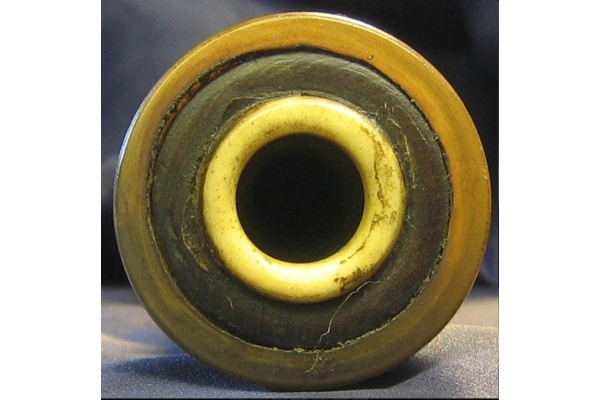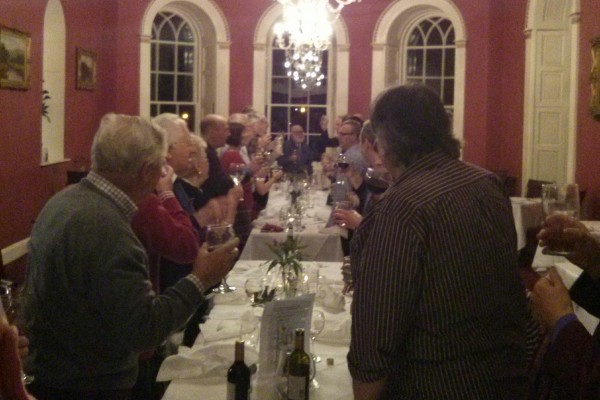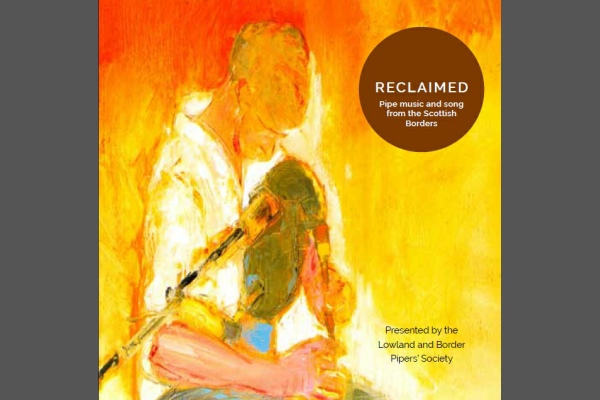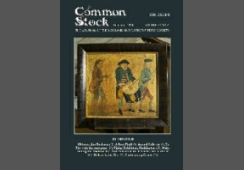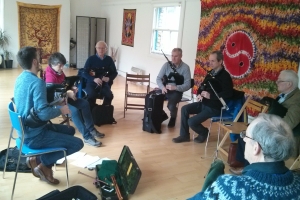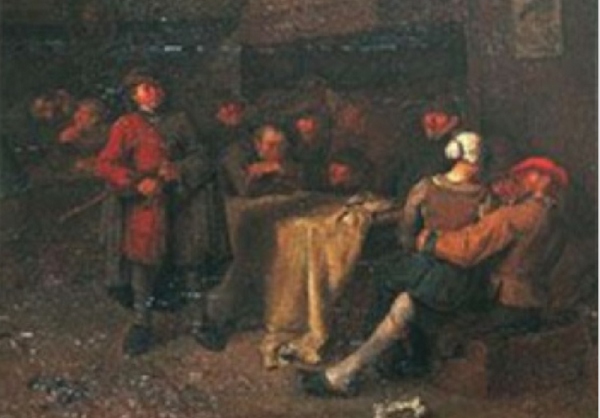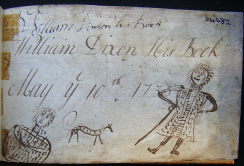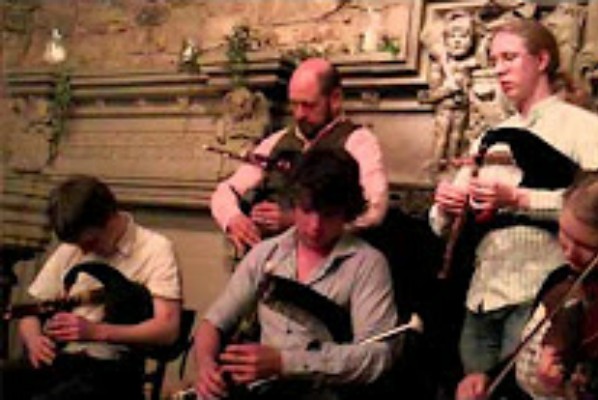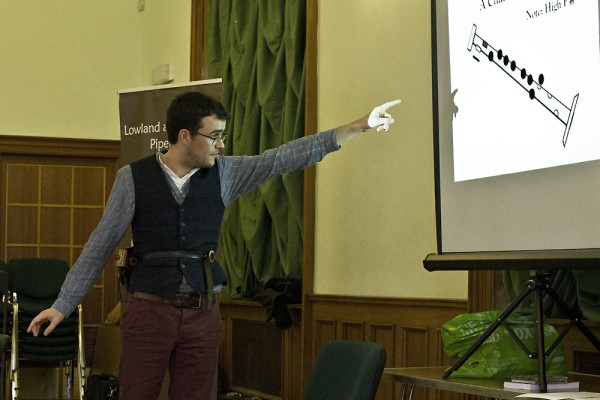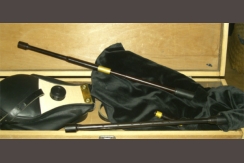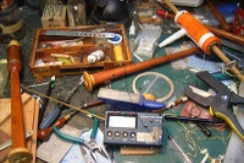


David Taylor, who teaches both Highland pipes and Scottish smallpipes, gives an appraisal of the atmosphere and standards of the 1996 L.B.P.S. Competition.
After a recent overdose of Highland piping competitions, the day was a pleasant surprise. After a gap of a few years, I had forgotten how relaxed and enjoyable the LBPS competition is. If it is possible to have a ‘non-competitive competition’ then this is it! The day seemed to flow along in an amicable and rather casual mood. Rather than slagging off rivals, the players enjoyed listening to each other, appreciating the different tunes, and seeing how friends had improved since last year. The audience vote is an excellent way of helping relax the atmosphere and involving everybody in the competition, as well as helping to ensure a fair result. (Interestingly the judges agreeing on 15 out of the 21 prize winners.) Long may it continue like this!
One thing I noticed in particular was how much standards have improved from the early years. There were some really sweet and well-tuned instruments, an interesting variety of tunes old and new, much better use of harmony in small-pipe duets, more emphasis on rhythm rather than speed. It was also noticeable how the instruments themselves have improved both aesthetically and tonally over the years. The variety of pipes, woods, mounts each with their individual tones and voices is a testimony to the outstanding craftsmanship of many of the pipe-makers.
However, there are still aspects which the less experienced players could work on before next year. Tone suffered in too many cases from poor bellows technique and - a rather neglected aspect - lack of control of the bag with the left arm. Some nice performances were spoilt by a failure to tune the drones, throwing the harmonics of the chanter off, while in some cases, musicality was still affected by racing tunes and even a failure to understand the basic rhythm. More emphasis on learning by ear might prove beneficial. When pipes are used with other instruments there is still scope for more imaginative arrangements.
It was disappointing that there were not entrants in the Novice section - is there a need to attract new players? However, in the Intermediate section, Peter McAllister emerged as clear winner with a beautifully rounded performance including a lovely version of Sleepy Maggie on a well-tuned instrument.
There were some good entries in the New Compositions though there was no doubt that Rory Campbell’s Austrian-style jig stole the show.
Small-pipes are at their best when playing along with other instruments, so it was dis- appointing to find only three entrants in this class. At the same time it was good to see some younger competitors here and the competition was won by Fiona and Finn Moore with a lovely swinging set of reels though it has to be said that the fiddle was rather overpowered by the heavy clogging.
Small-pipe and song was another good competition won by Davie Robertson with a powerful rendering of ‘Lang a Growin’, though with the pipes playing the melody they were at times a bit lost against the voice. Pipe harmonies (as demonstrated by Judy Barker) would have added to the richness of Davie’s voice.
In the small-pipe duet section it was good to see everyone trying to use harmonies, though it has to be pointed out that this only works if the chanters are in tune! There were some good tunes here with a particularly interesting use of harmony by John Goodacre and Pete Stewart. The section was won by Glyn Morris and Joe Bingham with a heavy set of tunes using a lot of harmony, though somewhat marred by the pipes going out of tune in the ‘Clumsy Lover’.
The Border-pipe is a much more difficult instrument to control than the small-pipe as it ruthlessly exposes any deficiencies in bellows technique, being prone to chokes, squeals and wavering pitch. While the best balanced pipe was Dougie Walker’s with a strong drone and sweet chanter, John Saunders emerged as winner with a set of Irish and Asturian tunes making highly effective use of flattened notes.
The Open Small-pipes was the strongest competition with twelve players taking part. There were some excellent tunes played in this competition, though the undisputed winner was Rory Campbell with the outstanding performance of the day - crisp fingering, beautiful pipes and terrific rhythm on his Strathspeys and Reels.
Finally, I think the highest audience marks of the day would go to the ladies who produced all the wonderful baking and food - but please put your prices up next year out of consideration to the waist lines! Good food, good crack, good piping - roll on next year....
Results
Intermediate: 1. Peter McAllister, 2 Trevor James, 3 John Long.
New Composition: 1. Rory Campbell, 2. = Jon Swayne & John Saunders
Pipe & Song: 1. Davie Robertson, 2. Judy Barker, 3. David Stevenson.
Duet for Pipes: 1. Glyn Morris & Joe Bingham. 2. Rona McDonald 3. Pete Stewart & John Goodacre
Duet for Pipes and Other Instrument: 1. Fin and Fiona Moor 2. Glyn Morris & Joe Bingham 3. Mike & Judy Barker
Open Lowland Pipe: 1. John Saunders, 2. Donald Anderson, 3. Jim Eaton.
_________________________________________________________________________
